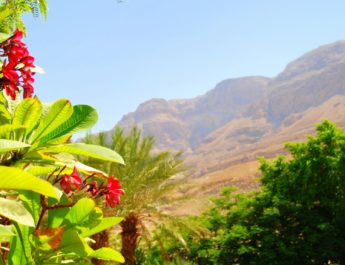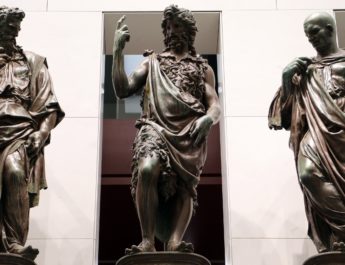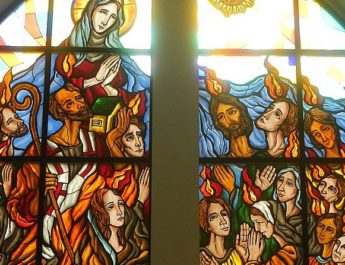Isaiah 49:5-16
A Women’s Lectionary – Palm Sunday 20
5 And now the LordI says,
who formedII me in the wombIII to be his servant,IV
I “Lord” = YHVH. From havah (to be, become) or hayah (to come to pass, become, be). This is the name of the God of Israel, the self-existent and eternal one, the tetragrammaton. This pronunciation has been lost to time so “Lord” is generally used in its place.
II “formed” = yatsar. Perhaps related to yatsar (to be narrow, distressed, or vexed); perhaps related to tsarar (to bind, restrict, narrow, be cramped, an adversary). This is to fashion or form, perhaps by squeezing something into a shape or form. Particularly, it is to create as a potter does. Figuratively, it is to determine.
III “womb” = beten. Root may mean to be hollow. This is the belly or womb. It can also refer to a body more broadly.
IV “servant” = ebed. From abad (to work, serve, compel; any kind of work; used causatively, can mean to enslave or keep in bondage). This is a servant, slave, or bondservant.
to bring JacobV backVI to him,
and that IsraelVII might be gatheredVIII to him,
V “Jacob” = Yaaqob. From the same as aqeb (heel, hind part, hoof, rear guard of an army, one who lies in wait, usurper). This is Isaac’s son and his descendants. The name means heel-catcher or supplanter.
VI “bring…back” = shub. To turn back, return, turn away – literally or figuratively. Doesn’t necessarily imply going back to where you started from. This is also the root verb for the Hebrew word for repentance “teshubah.”
VII “Israel” = Yisrael. From sarah (to persist, exert oneself, contend, persevere, wrestle, prevail) + el (God or god). This is Israel, meaning God strives or one who strives with God; new name for Jacob and for his offspring. This refers to the people and to the land.
VIII “gathered” = asaph. This is to gather, assemble, or bring. It can also mean to take away, destroy, or remove.
for I am honoredIX in the sightX of the Lord,
and my GodXI has becomeXII my strengthXIII—
IX “honored” = kabad. To be heavy, weighty, or severe. It can also be positive abounding in, rich, or honorable. The Hebrew word for “glory,” kabod, is taken from this root.
X “sight” = ayin. This is eye in a literal or figurative sense so eye, appearance, favor, or a fountain (the eye of the landscape).
XI “God” = Elohim. Related to “Israel” in v5. See note VII above.
XII “become” = hayah. Related to “Lord” in v5. See note I above.
XIII “strength” = oz. From azaz (to be strong, become fixed, be bold, prevail, be impudent; it means to be stout literally or figuratively. A Late Hebrew word). This is strength in the sense of force, majesty, praise, material and physical strength, the abstract notion of security. It can also speak of social or political power.
6 he says,
“It is too light a thingXIV that you should beXV my servant
to raise upXVI the tribesXVII of Jacob
and to restoreXVIII the survivorsXIX of Israel;
XIV “is too light a thing” = qalal. This is to be little, insignificant, swift. It can also mean to bring down in esteem, create contempt, curse.
XV “be” = hayah. Same as “become” in v5. See note XII above.
XVI “raise up” = qum. To arise, stand, accomplish, establish, abide. This is rising as in rising against, getting up after being sick or asleep, arising from one state to another, becoming powerful, or rising for action. It can also be standing in a figurative sense.
XVII “tribes” = shebet. This is a rod, staff, club, scepter, dart, or tribe. Literally a stick that can be used for punishing, writing, fighting, walking, ruling; thus, used figuratively for a clan.
XVIII “restore” = shub. Same as “bring…back” in v5. See note VI above.
XIX “survivors” = natsir. 1x in OT. From natsar (to watch, guard, or keep; this is to preserve, protect, or maintain; it can also mean conceal). Literally it means preserved, but it is used in a passive sense here to mean those who are delivered. Incidentally, the root of this word is a possible root of the name of the city of Nazareth.
I will giveXX you as a lightXXI to the nations,XXII
XX “give” = natan. This is to give, put, set, offer. It is to give literally or figuratively.
XXI “light” = or. From or (to be or become light). This is light, sun, sunshine, dawn, or daylight. Figuratively, it can refer to light from instruction, light of a face (that is to say one that is cheerful or finds favor). It can refer to prosperity or salvation; a light that guides, a light eternal from Zion.
XXII “nations” = goy. From the same root as gevah (the back, person, or body); related to gev (among); related to gaah (to rise up). This is nation or people. Often used to refer to Gentiles or foreign nations. It can also be used figuratively for a group of animals. This is where the Yiddish “goy” comes from.
that my salvationXXIII may reachXXIV to the endXXV of the earth.”XXVI
XXIII “salvation” = yeshuah. From yasha (to deliver, defend, help, preserve, rescue, be safe. Properly, to be open, wide or free, which implies being safe. Used causatively, it means to free). This is salvation, deliverance, health, victory, prosperity.
XXIV “reach” = hayah. Same as “become” in v5. See note XII above.
XXV “ends” = qatseh. From qatsah (to cut off, cut short; figuratively, to destroy). This is end, brink, border, edge, frontier. It can refer to that which is within set boundaries.
XXVI “earth” = erets. Root may mean to be firm. This is earth, ground, field land, or country.
7 Thus says the Lord,XXVII
the RedeemerXXVIII of Israel and his Holy One,XXIX
XXVII “Lord” = YHVH. Related to “Lord” in v5 & “become” in v5. See note I above. It has the same meaning as “Lord,” but with a different vowel pointing.
XXVIII “Redeemer” = gaal. This is to redeem someone or something according to kinship laws. So, it could be acting on a relative’s behalf to buy back their property, to marry one’s brother’s widow, etc. This could be more briefly translated as to redeem, acts as kinsman, or purchase. As a noun, it could be deliverer or avenger.
XXIX “Holy One” = qadosh. From qodesh (set apart and so sacred; God is different from us and so God is holy/set apart; things we dedicate to God’s service are set apart for God and so they, too, are holy); related to qadash (set apart, consecrated, hallowed, sanctified; something or someone set apart for a holy purpose or use – ceremonially or morally clean). This is sacred or holy in a ritual or moral sense. As a noun, it refers to a holy one (like a saint or angel), a holy place (the sanctuary), or God (the Holy One).
to one deeply despised,XXX abhorredXXXI by the nations,
the slaveXXXII of rulers,XXXIII
“KingsXXXIV shall seeXXXV and stand up,XXXVI
XXX “deeply despised” = bazoh. 1x in OT. From bazah (to despise, disdain; contempt, despicable, vile person). This is one who is scorned or despised.
XXXI “abhorred” = taab. From toebah (abomination, loathsome, something morally disgusting or abhorrent). This is to abhor, despise, to reject, to act abominably.
XXXII “slave” = ebed. Same as “servant” in v5. See note IV above.
XXXIII “rulers” = mashal. This is to rule, reign, govern, have authority, wield.
XXXIV “kings” = melek. From malak (to be or become king or queen, to rise to the throne, to be crowned; by implication, to take counsel). This is king or royal.
XXXV “see” = raah. This is to see in a literal or figurative sense so stare, advise, think, view.
XXXVI “stand up” = qum. Same as “raise up” in v6. See note XVI above.
princes,XXXVII and they shall prostrateXXXVIII themselves,
because of the Lord,XXXIX who is faithful,XL
the Holy One of Israel, who has chosenXLI you.”
XXXVII “princes” = sar. This is chief, leader, ruler, lord, official, governor, prince, military leader. It refers to someone at the top of a rank or class.
XXXVIII “prostrate” = shachah. This is to bow down, make a humble entreaty, to do homage to royalty or to God.
XXXIX “Lord” = YHVH. Same as “Lord” in v7. See note XXVII above.
XL “is faithful” = aman. This is to believe, endure, fulfill, confirm, support, be faithful. It is to put one’s trust in, be steadfast. Figuratively, this is to be firm, steadfast, or faithful, trusting, believing, being permanent, morally solid. This is where the word “amen” comes from.
XLI “chosen” = bachar. This is to choose, appoint, try, excellent.
8 Thus says the Lord:XLII
In a timeXLIII of favorXLIV I have answeredXLV you,
on a dayXLVI of salvation I have helpedXLVII you;
XLII “Lord” = YHVH. Same as “Lord” in v7. See note XXVII above.
XLIII “time” = et. Probably from anah (to answer, sing, announce); from ad (forever, all, old); from adah (to pass on, advance, decorate oneself). This is a period or season. It can also mean whenever or continually.
XLIV “favor” = ratson. From ratsah (to be pleased with, delight, take pleasure in, or accept with favor; to approve or consent regarding something; can be used specifically of satisfying debts or being pardoned). This is delight shown in favor, good will, something that is accepted or acceptable.
XLV “answered” = anah. Related to “time” in v8. See note XLIII above.
XLVI “day” = yom. Root may mean being hot. This is the day in a literal or figurative sense. It can also mean birth, age, daylight, continually or other references to time.
XLVII “helped” = azar. This is to surround, which implies encircling to protect someone or help them out. It can also be help, ally, or support.
I have keptXLVIII you and given you
as a covenantXLIX to the people,L
XLVIII “kept” = natsar. Related to “survivors” in v6. See note XIX above.
XLIX “covenant” = berit. Perhaps from barah (to eat, choose, make clear); perhaps from bar (grain, wheat); from bara (to select, purify, cleanse, test, brighten, polish). This is a compact, covenant, alliance, treaty, or league.
L “people” = am. From amam (to darken, hide, associate; creating shadows by huddling together). This is people or nation. It can be used specifically for a tribe, collectively of troops or armies, or figuratively to refer to a flock of animals.
to establishLI the land,LII
to apportionLIII the desolateLIV heritages;LV
LI “establish” = qum. Same as “raise up” in v6. See note XVI above.
LII “land” = erets. Same as “earth” in v6. See note XXVI above.
LIII “apportion” = nachal. From nachalah (properly something that was inherited; can mean occupancy generally or, more particularly, an heirloom or an estate; can be an inheritance, gift, possession, or portion). This is to gain as a possession, divide for inheritance. Also, to occupy for any reason.
LIV “desolate” = shamem. This is to stun or become numb. It can also mean to devastate or be appalled. Cnan also mean to be amazed or astonished.
LV “heritages” = nachalah. See note LIII above.
9 saying to the prisoners,LVI “Come out,”LVII
to those who are in darkness,LVIII “ShowLIX yourselves.”
LVI “prisoners” = asar. This is to tie, yoke, bind, or fasten. It can mean to harness an animal, to join in fighting a battle, or to imprison someone.
LVII “come out” = yatsa. This is to go or come out, bring forth, appear. It is to go out in a literal or figurative sense.
LVIII “darkness” = choshek. From chashak (to be or become dark). This is literal darkness is contrast to light. Figuratively, it can be obscurity, sorrow, misery, blindness, wickedness, destruction, death. It can also be hiding places. Additionally, it can mean judgment, mourning, ignorance, evil, or sin.
LIX “show” = galah. This is to remove, bring, carry, lead, appear, advertise. It can mean to strip someone or something bare in a negative sense. Captives were typically stripped before they were sent into exile. Used figuratively, in a positive sense, this word means reveal, disclose, discover.
They shall feedLX along the ways,LXI
on allLXII the bare heightsLXIII shall be their pasture;LXIV
LX “feed” = ra’ah. This is to tend a flock, pasture, or graze. It can mean to rule or to associate with someone. Figuratively, it can be ruler or teacher.
LXI “ways” = derek. From darak (to tread, march, to walk. Can also mean affixing a string to a box since one needs to step on it to bend it in the process; so also an archer). This is a road as a thing that is walked on. Can be used figuratively for the path that one’s life takes or how one chooses to live one’s life.
LXII “all” = kol. From kalal (to complete). This is all or every.
LXIII “bare heights” = shephi. 10x in OT. From shaphah (to sweep bare, stick out). This is smoothness, a high place, stick out, a bare height.
LXIV “pasture” = marith. Related to “feed” In v9. 10x in OT. From ra’ah (see note LX above). This is shepherding, pasturage, a flock.
10 they shall not hungerLXV or thirst,LXVI
neither scorching windLXVII nor sunLXVIII shall strike them down,LXIX
LXV “hunger” = raeb. 17x in OT. This is to be hungry or famished.
LXVI “thirst” = tsame. 10x in OT. This is to thirst in a literal or figurative sense.
LXVII “scorching wind” = sharab. 2x in OT. This could be burning heat or scorched land. The root may mean to glare so it would refer to the wavy appearance of the air in intense heat.
LXVIII “sun” = shemesh. This is sun or toward the east. Its root may mean being brilliant. Figuratively, this could be a ray or an arch.
LXIX “strike…down” = nakah. This is to hit whether lightly or severely. It can be used in a literal or figurative sense. So, this could be beat, punish, give wounds, kill, or slaughter.
for he who has pityLXX on them will leadLXXI them,
and by springsLXXII of waterLXXIII will guideLXXIV them.
LXX “has pity” = racham. From racham (compassion, tender love, womb, compassion; the womb as that which cherishes the fetus); from the same as rechem (womb). This is to love, fondle, have mercy, have or show compassion.
LXXI “lead” = nahag. This is to drive as in driving flocks, but also driving in animal or vehicle like a chariot. It can mean to carry away, lead, drive away, proceed, or guide. It can also relate to behavior and what one is accustomed to.
LXXII “springs” = mabbua. 3x in OT. From naba (to flow, spring, bubble up, pour, gush forth; figurative for speaking good or poor words. Can also mean giving off a bad smell). This is a spring of water, well, or fountain.
LXXIII “water” = mayim. This is water, waters, or waterway in a general sense. Figuratively, it can also mean juice, urine, or semen.
LXXIV “guide” = nahal. This is leading or guiding – specifically to a resting place or somewhere where there is water. So, it can mean to refresh or feed, protect or sustain. The word itself carries a sense of flowing, sparkling water. This is the word used in Psalm 23 “he leads me beside still waters.”
11 And I will turnLXXV all my mountainsLXXVI into a road,LXXVII
and my highwaysLXXVIII shall be raised up.LXXIX
LXXV “turn” = sim. This is to put or place in a literal or figurative sense. It can be appoint, care, change, make, and may other things.
LXXVI “mountains” = har. From harar (hill or mountain). This is mountain, hill, hilly region.
LXXVII “road” = derek. Same as “ways” in v9. See note LXI above.
LXXVIII “highways” = mesillah. From salal (to lift up, build, pile, extol, exalt; can also be used for opposing as a dam holds back water). This is highway, path, step. It could be a course in a figurative sense or specifically a viaduct or staircase.
LXXIX “raised up” = rum. This is to rise or raise, to be high literally or figuratively. So it can also mean to exalt or extol.
12 Lo,LXXX these shall comeLXXXI from far away,LXXXII
and lo, these from the northLXXXIII and from the west,LXXXIV
and these from the land of Syene.
LXXX “lo” = hinneh. From hen (lo! Behold! If, though; an expression of surprise). This is to draw attention, show suddenness or surprise, or to emphasize the importance of the coming statement. See! Lo! Behold!
LXXXI “come” = bo. This is to enter, come in, advance, fulfill, bring offerings, enter to worship, attack. It can also have a sexual connotation.
LXXXII “far away” = rachoq. From rachaq (to widen, become distant, cast, or remove in a literal or figurative sense). This is distant or far, whether of space or of time.
LXXXIII “north” = tsaphon. From tsaphan (to hide, hoard, reserve; to cover over or figuratively to deny; also to lurk). This is properly hidden, dark, or gloomy. It can also be used to refer to the north.
LXXXIV “west” = yam. Root may mean to roar. This is the sea, often referring to the Mediterranean. It comes from the root in the sense of the roar of crashing surf. This word is sometimes used for rivers or other sources of water. It can mean to the west or to the south.
13 Sing for joy,LXXXV O heavens,LXXXVI and exult,LXXXVII O earth;
break forth,LXXXVIII O mountains, into singing!LXXXIX
LXXXV “sing for joy” = ranan. This is a cry of joy or a joyful song. Properly, it is emitting a shrill sound, especially one of joy.
LXXXVI “heavens” = shamayim. Root may mean being lofty. This is sky, the air, or heaven. It is in a dual noun form so this might refer to the part of the sky where the clouds move on the one hand and the part beyond that where the sun, moon, and stars are on the other hand.
LXXXVII “exult” = gil. Properly, this is twirling around because of a strong feeling whether of rejoicing or from fear. This can be rejoice, be glad or joyful, or to cry.
LXXXVIII “break forth” = patsach. 8x in OT. This is to burst forth with in joy or with a loud sound.
LXXXIX “singing” = rinnah. Related to “sing for joy” in v13. From ranan (see note LXXXV above). This is a song, shout, cry of joy, or proclamation. It could also be a shout of grief.
For the LordXC has comfortedXCI his people,
and will have compassionXCII on his sufferingXCIII ones.
XC “Lord” = YHVH. Same as “Lord” in v7. See note XXVII above.
XCI “comforted” = nacham. Properly, this is a strong breath or a sigh. This can be to be sorry, to pity, console. Comfort, or repent. But, one can also comfort oneself with less righteous thoughts, so this can also mean to avenge oneself.
XCII “have compassion” = racham. Same as “has pity” in v10. See note LXX above.
XCIII “suffering” = ani. From anah (to be bowed down; humility or being browbeaten, oppressed, afflicted, or depressed; literal or figurative – depressed in mood or circumstance). This is humble, lowly, poor, or afflicted.
14 But ZionXCIV said, “The LordXCV has forsakenXCVI me,
my LordXCVII has forgottenXCVIII me.”
XCIV “Zion” = Tsiyyon. Related to tsyiyyun (signpost, monument); from tsavah (to charge someone, to command, order); from the same as tsiyyah (dryness drought); from a root meaning parched as desert, dry land. Zion can refer to a mountain in Jerusalem as well as another name for Jerusalem itself or the people.
XCV “Lord” = YHVH. Same as “Lord” in v7. See note XXVII above.
XCVI “forsaken” = azab. To loosen, relinquish, permit, forsake, fail, leave destitute.
XCVII “Lord” = Adonai. From adon (lord, master, owner); root means to rule or be sovereign. This is the actual Hebrew word for Lord used (in a different form) of humans and (in the present form) of God. It means someone who is in control.
XCVIII “forgotten” = shakach. This is to forget because of not remembering something or not paying attention to it. It can also mean to mislay.
15 Can a womanXCIX forget her nursing child,C
or show no compassionCI for the childCII of her womb?
Even these may forget,
yet I will not forget you.
XCIX “woman” = ishshah. From ish (man); perhaps from enosh (human, humankind, mortal); from anash (to be weak, sick, or frail). This is woman, wife, or female.
C “nursing child” = ul. 3x in OT. From ul (to nurse, suckle). This is an infant – a child that is nursing.
CI “show…compassion” = racham. Same as “has pity” in v10. See note LXX above.
CII “child” = ben. From banah (to build or obtain children). This is son, age, child. It is son in a literal or figurative sense.
16 See,CIII I have inscribedCIV you on the palmsCV of my hands;
your wallsCVI are continuallyCVII beforeCVIII me.
CIII “see” = hen. Related to “lo” in v12. See note LXXX above.
CIV “inscribed” = chaqaq. 19x in OT. This is to inscribe, carve, or decree. It can be a lawmaker/commander or a staff/scepter. Literally, this is engraving, but it implies enacting a law because laws were carved into stone or metal.
CV “palms” = kaph. From kaphaph (to bend – from a root meaning curve or bend down). This is palm of the hand or sole of the foot, footstep, grasp. Figuratively, it can also mean power.
CVI “walls” = chomah. From the same as cham (father-in-law – one’s husband’s father; perhaps from a root meaning to join). This is a wall – a wall as used for protection.
CVII “continually” = tamid. May come from a word that means to stretch. This word means an indefinite period of time. So, it could be regular or daily. It could also be constantly, continually, always, or perpetually.
CVIII “before” = neged. From nagad (to declare, make conspicuous, stand in front, manifest, predict, explain). This is in front of, opposite to. It can refer to a counterpart or partner, one corresponding to or in the sight of.
Image credit: “Cry Baby Cry” by tostadophoto.com, 2006.




